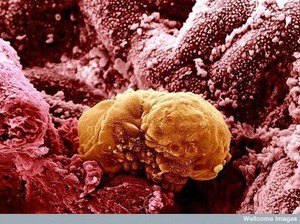Biotech giant Amgen announced on 18 January 2018 that it had received European Commission (EC) approval for its biosimilar bevacizumab product Mvasi (ABP 215).
EC approval for bevacizumab biosimilar Mvasi
Biosimilars/News
|
Posted 02/02/2018
 0
Post your comment
0
Post your comment

Bevacizumab is a humanized monoclonal antibody. It inhibits angiogenesis (the formation of new blood vessels) by blocking the action of vascular endothelial growth factor A (VEGF-A). Bevacizumab can therefore slow the growth of new blood vessels in tumours and is used to treat various cancers, including colorectal, lung, breast, glioblastoma, kidney and ovarian.
The approval by the EC follows the European Medicines Agency’s (EMA) Committee for Medicinal Products for Human Use (CHMP) positive recommendation on 10 November 2017 [1].
Mvasi is the first biosimilar bevacizumab approved by the EC. It has been approved for the treatment of certain types of cancers, including in combination with fluoropyrimidine-based chemotherapy for metastatic carcinoma of the colon or rectum; in combination with paclitaxel for metastatic breast cancer; in combination with platinum-based chemotherapy for unresectable advanced, metastatic or recurrent non-squamous non-small cell lung cancer (NSCLC); in combination with erlotinib for unresectable advanced, metastatic or recurrent non-squamous NSCLC; in combination with interferon alpha-2a for advanced and/or metastatic renal cell cancer; in combination with carboplatin and paclitaxel, carboplatin and gemcitabine, and paclitaxel, topotecan, or pegylated liposomal doxorubicin for advanced, platinum-sensitive, or platinum-resistant recurrent epithelial ovarian, fallopian tube, or primary peritoneal cancer; and in combination with paclitaxel and cisplatin, or alternatively, paclitaxel and topotecan for persistent, recurrent, or metastatic carcinoma of the cervix.
The approval was based on a comprehensive data package that demonstrated Mvasi and originator bevacizumab, Roche’s Avastin, are highly similar, with no clinically meaningful differences in terms of the efficacy, safety and immunogenicity between the products. Clinical studies included results from a phase III trial in patients with non-squamous NSCLC.
Mvasi is the first biosimilar to come out of the Amgen/Allergan collaboration. The companies are collaborating on the development and commercialization of four oncology biosimilars.
Mvasi was also approved by the US Food and Drug Administration on 14 September 2017 [2].
Related article
Biosimilars of bevacizumab
References
1. GaBI Online - Generics and Biosimilars Initiative. EMA approval for bevacizumab biosimilar Mvasi [www.gabionline.net]. Mol, Belgium: Pro Pharma Communications International; [cited 2018 Feb 2]. Available from: www.gabionline.net/Biosimilars/News/EMA-approval-for-bevacizumab-biosimilar-Mvasi
2. GaBI Online - Generics and Biosimilars Initiative. FDA approves bevacizumab biosimilar Mvasi [www.gabionline.net]. Mol, Belgium: Pro Pharma Communications International; [cited 2018 Feb 2]. Available from: www.gabionline.net/Biosimilars/News/FDA-approves-bevacizumab-biosimilar-Mvasi
Permission granted to reproduce for personal and non-commercial use only. All other reproduction, copy or reprinting of all or part of any ‘Content’ found on this website is strictly prohibited without the prior consent of the publisher. Contact the publisher to obtain permission before redistributing.
Copyright – Unless otherwise stated all contents of this website are © 2018 Pro Pharma Communications International. All Rights Reserved.
Source: Amgen
Research
Reaching ESG goals in pharmaceutical development
What is the future for the US biosimilar interchangeability designation
General
Samsung Bioepis wins Pyzchiva case; Regeneron patent rulings threaten foreign biosimilars
Chinese biosimilars go global: growth, partnerships, and challenges
Most viewed articles
The best selling biotechnology drugs of 2008: the next biosimilars targets
Global biosimilars guideline development – EGA’s perspective
Related content
FDA approves Poherdy (first interchangeable pertuzumab) and Armlupeg (pegfilgrastim) biosimilars
EMA recommends approval for insulin glargine biosimilar Ondibta and denosumab biosimilar Osqay
FDA approves denosumab biosimilars Osvyrti and Jubereq, Boncresa and Oziltus
FDA approves aflibercept biosimilar Eydenzelt and label expansion for adalimumab biosimilar Yuflyma
FDA approves Poherdy (first interchangeable pertuzumab) and Armlupeg (pegfilgrastim) biosimilars

Biosimilars/News Posted 27/01/2026
EMA recommends approval for insulin glargine biosimilar Ondibta and denosumab biosimilar Osqay

Biosimilars/News Posted 16/01/2026
FDA approves denosumab biosimilars Osvyrti and Jubereq, Boncresa and Oziltus

Biosimilars/News Posted 07/01/2026
FDA approves aflibercept biosimilar Eydenzelt and label expansion for adalimumab biosimilar Yuflyma

Biosimilars/News Posted 05/12/2025
The best selling biotechnology drugs of 2008: the next biosimilars targets






Post your comment